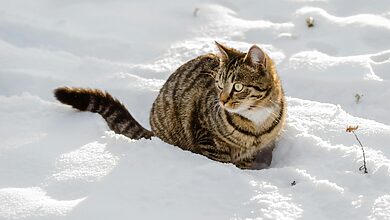
With regards to our pets, playtime is way over a easy pastime. It is a key part of their total well-being and psychological acuity. On this information, we’ll delve into the various advantages of normal playtime for pets and the way it contributes to holding them mentally sharp. Whether or not you’ve got a canine, cat, rabbit, guinea pig, or hamster, playtime is important for his or her happiness and cognitive growth.
Table of contents
- Understanding the Significance of Playtime
- Tailoring Playtime for Completely different Pets
- Indicators That Your Pet Wants Extra Psychological Stimulation
- Protecting Your Pet Mentally Sharp as They Age
- DIY Pet Toys
- Enjoyable Methods to Incorporate Playtime into Your Routine
- Science-Backed Advantages of Common Playtime
- Making a Mentally Stimulating Surroundings for Your Pet
- Advantages of Common Playtime
Understanding the Significance of Playtime
1. The Function of Playtime for Pets
Playtime is not only about enjoyable; it is a elementary side of your pet’s life. This is why it issues:
Psychological Stimulation: Play engages your pet’s thoughts, holding them mentally sharp. Puzzles, toys, and interactive video games problem their mind.
- Bodily Train: Playtime ensures that your pet will get the bodily exercise they should preserve a wholesome weight and cardiovascular health.
- Emotional Nicely-being: Playtime can alleviate stress and anxiousness, offering an emotional outlet in your pet.
- Bonding: It strengthens the bond between you and your pet, fostering belief and companionship.
- Prevention of Boredom: Boredom can result in harmful habits in pets. Playtime presents another focus for his or her vitality.
2. Psychological Stimulation Toys for Pets
To hold your pet mentally sharp, take into account these stimulating toys:
- Puzzle Toys: Puzzle feeders problem your pet to determine the best way to entry their treats or meals, offering psychological train.
- Interactive Toys: Toys that reply to your pet’s actions, like rolling balls that dispense treats, can hold them engaged and curious.
- DIY Toys: You do not all the time want store-bought toys. Easy gadgets like cardboard packing containers or paper luggage can grow to be intriguing playthings.
Tailoring Playtime for Completely different Pets
1. Canine
- Fetch and Retrieval Video games: Most canines love chasing and retrieving gadgets. In case your canine does not get pleasure from fetch, strive tossing their favourite toy as a substitute.
- Tug of Warfare: This sport could be a nice exercise for each you and your canine, so long as it is completed safely with acceptable toys.
- Conceal and Search: Conceal treats round the home and encourage your canine to search out them. This engages their scent-tracking skills and gives psychological stimulation.
2. Cats
- Feather Wands: Cats typically get pleasure from stalking and pouncing. Feather wands mimic prey, offering a perfect playtime alternative.
- Interactive Laser Pointers: Cats love chasing the elusive pink dot. Make sure you by no means shine the laser pointer straight into their eyes.
- Field Play: Cats are well-known for his or her love of packing containers. Present empty cardboard packing containers to discover and conceal in.
3. Small Pets (Rabbits, Guinea Pigs, Hamsters)
- Impediment Programs: Create miniature impediment programs utilizing tunnels, ramps, and bridges for small pets to navigate.
- Deal with Dispensers: Toys that dispense treats as pets play with them will be extremely partaking.
- Train Balls: Some small pets get pleasure from exploring in train balls, which could be a enjoyable and secure manner for them to roam.
Indicators That Your Pet Wants Extra Psychological Stimulation
It is important to acknowledge when your pet could be craving extra psychological stimulation:
- Harmful Habits: In case your pet is tearing up furnishings or chewing on objects, it could be because of boredom.
- Restlessness: Restlessness or extreme barking/meowing can point out pent-up vitality.
- Weight Acquire: Lack of exercise can contribute to weight achieve, which will be detrimental to your pet’s well being.
- Extreme Grooming: Some pets interact in extreme grooming after they’re anxious or bored.
- Vocalization: Elevated vocalization could be a signal of restlessness or frustration in pets.
Protecting Your Pet Mentally Sharp as They Age
As pets age, they could require changes to their playtime routines:
- Gentler Play: Senior pets won’t be as agile as they as soon as have been, so select gentler, much less bodily demanding play actions.
- Psychological Puzzles: Puzzle toys that problem their cognitive skills will help hold senior pets mentally sharp.
- Common Veterinary Checkups: Schedule common checkups to deal with any age-related well being points promptly.
DIY Pet Toys
You do not all the time want store-bought toys; DIY choices will be simply as partaking:
- Cardboard Containers: Cats love packing containers for hiding, pouncing, and scratching.
- Paper Baggage: Baggage crumple and make intriguing sounds, making them a favourite amongst cats.
- Knotted T-Shirt Rope: Previous T-shirts will be repurposed right into a knotted rope for tug-of-war with canines.
- Do-it-yourself Deal with Dispensers: Create your individual treat-dispensing toys utilizing empty plastic bottles with holes for treats to fall out as your pet performs.
Enjoyable Methods to Incorporate Playtime into Your Routine
Making playtime an everyday a part of your pet’s day will be each fulfilling and useful. Listed here are some ideas:
- Set a Schedule: Consistency is vital. Put aside particular occasions every day for play.
- Rotate Toys: To maintain playtime thrilling, rotate your pet’s toys each few days.
- Supervise Play: At all times supervise play, particularly with new toys, to guarantee your pet’s security.
- Out of doors Adventures: In case you have a canine, out of doors adventures like mountaineering or journeys to the canine park are implausible methods to mix train and play.
- Interactive Deal with Toys: Use interactive deal with toys to make playtime rewarding. These toys dispense treats as your pet performs, holding them engaged.
- Play with Function: Use playtime as a chance to show your pet new methods or reinforce current instructions.
- Playdates: Prepare playdates with different pets, so your furry pal can socialize and play with others.
Science-Backed Advantages of Common Playtime
Research have proven that common playtime presents quite a few advantages to pets, together with:
- Improved Downside-Fixing Expertise: Puzzle toys and interactive video games can improve your pet’s problem-solving skills.
- Stress Discount: Playtime reduces stress by offering an outlet for extra vitality and selling leisure.
- Enhanced Bodily Health: Lively play helps preserve a wholesome weight and retains muscular tissues and joints in good situation.
- Elevated Bonding: Enjoying collectively fosters a stronger emotional connection between you and your pet.
- Higher Habits: Pets that get pleasure from common play are much less more likely to exhibit harmful habits.
Making a Mentally Stimulating Surroundings for Your Pet
Past playtime, you’ll be able to create an atmosphere that stimulates your pet’s thoughts:
- Present Enrichment Actions: Puzzle feeders and treat-dispensing toys make mealtime extra partaking.
- Rotate Toys: As talked about earlier, rotating toys prevents boredom.
- Coaching Classes: Common coaching periods problem your pet’s thoughts and reinforce good habits.
- Social Interplay: Interplay with different pets or individuals can even present psychological stimulation.
- Out of doors Exploration: In case you have a secure out of doors area, permit your pet supervised out of doors time to discover new scents and sights.
Advantages of Common Playtime
Playtime is extra than simply enjoyable and video games; it is a important side of your pet’s well-being. By understanding the significance of play, tailoring it to your pet’s wants, recognizing indicators of inadequate psychological stimulation, and making play an everyday a part of their routine, you are making certain that your furry pal stays mentally sharp and enjoys a happier, more healthy life. So, seize your pet’s favourite toy and begin enjoying—it is a win-win for each of you.








